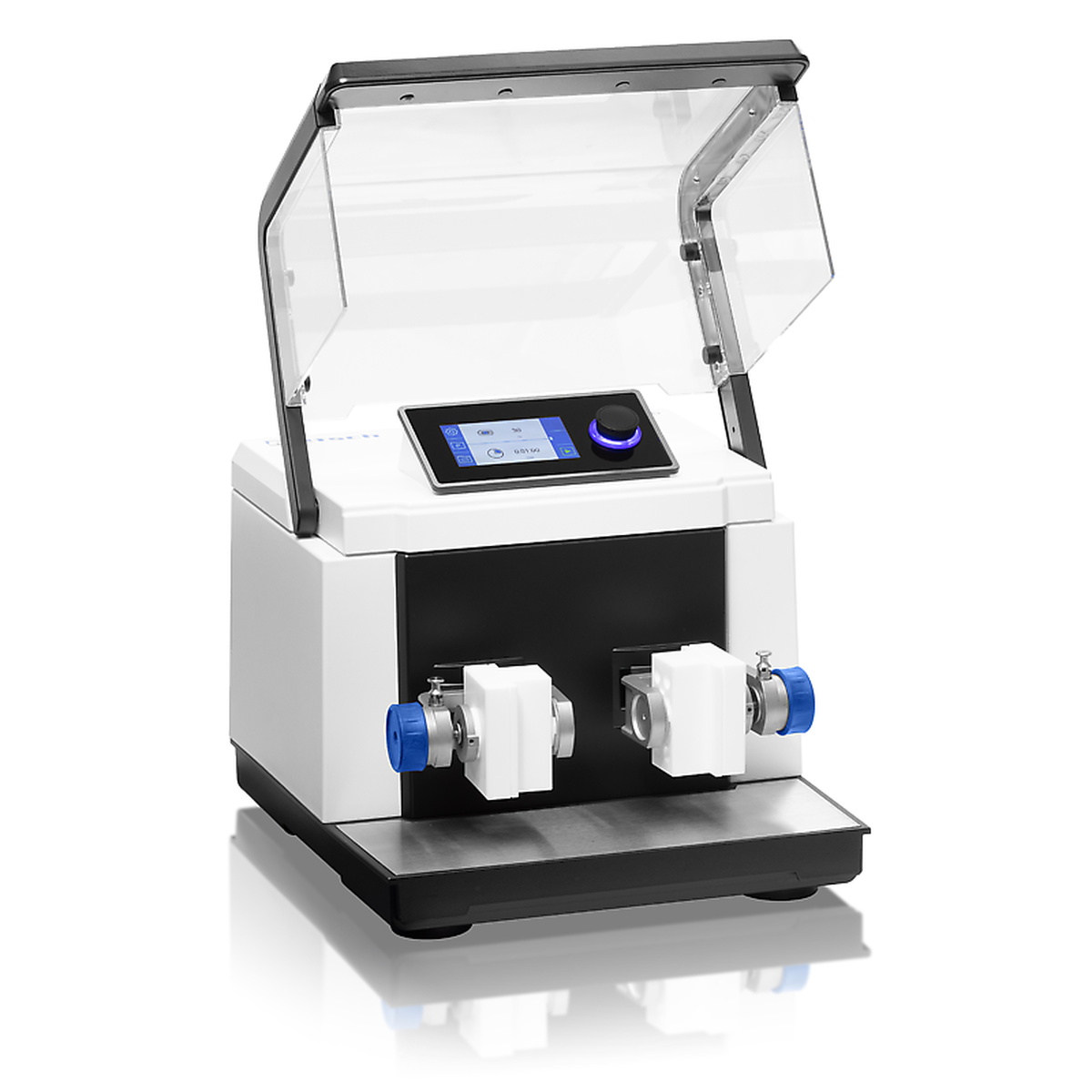Canada’s Instrumentation Leader Since 1946.


The Mixer Mill MM 400 is a true multipurpose mill designed for dry, wet and cryogenic grinding of small volumes up to 2 x 20 ml.
The Mixer Mill MM 400 is a true multipurpose mill designed for dry, wet and cryogenic grinding of small volumes up to 2 x 20 ml. It mixes and homogenizes powders and suspensions with a frequency of 30 Hz within seconds – unbeatably fast and easy to operate.
The compact benchtop unit is suitable for classic homogenization processes, as well as for biological cell disruption for DNA/RNA and protein extraction. Long processing times up to 99 hours make the MM 400 ideally suited for research applications, for example in mechanochemistry.
With regard to performance and flexibility of this mill, there is no equivalent technology available in the market.
You may also be interested in the mixer mill models MM 500 nano and MM 500 vario which operate with the same functional principle at a frequency of 35 Hz but provide substantially higher performance. For applications which require cooling or heating the sample, the Mixer Mill MM 500 control is the perfect choice. Each RETSCH mixer mill has a specific application focus.
Reproducibility is paramount in the process chain from sampling to analysis. Lab equipment which can be calibrated guarantees reproducible results with minimum standard deviation every time. This is particularly useful when comparing results produced at different locations.
The MM 400 is the first laboratory mill which can be calibrated. RETSCH initially calibrates time and frequency of the mill and offers a regular calibration service to ensure reproducible milling processes.
This functionality is particularly suitable for
Mixer mills are frequently used for homogenizing biological samples. The so-called bead beating with small glass beads is an established method for cell disruption of yeasts, microalgae or bacteria. The sample is only moderately warmed in the process which can be reduced to a minimum by pre-cooling.
The MM 400 allows for efficient cell disruption of up to 240 ml cell suspension for DNA/RNA and protein extraction. For accurate diagnosis of infections, it is possible to isolate intact bacteria from tissue in 8 x 30 ml bottles or 10 x 5 ml vials by using adapters.
The MM 400 can be operated with a range of adapters for single-use vials with the following capacities:
20 x 0.2 ml / 20 x 1.5 or 2 ml / 10 x 5 ml / 8 x 30 ml / 8 x 50 ml
For the pulverization of 25 to 30 g plant material, such as cannabis flower, conical centrifuge tubes are best suited. Up to 8 tissue samples, like fresh liver in buffer solution, can also be homogenized in these 50 ml tubes using steel or zirconium oxide balls. To keep the mechanical stress on the vials as low as possible, a reduced frequency and a high filling level, e. g. with buffer and sample, are recommended.
The CryoKit is a cost-effective solution for cryogenic sample processing with the Mixer Mill MM 400. The set consists of two insulated containers, two tongs and safety glasses.
The sample to be embrittled and the grinding ball are filled into the stainless-steel grinding jar which is tightly screwed. Indirect embrittlement is effected by pre-cooling the jar in a liquid nitrogen bath. After approximately 2 minutes, the sample is sufficiently cooled for cryogenic processing.
If direct contact with liquid nitrogen is to be avoided, the CryoMill or Mixer Mill MM 500 control are suitable options. Both mills can be operated with jars made of other materials than steel for cryogenic grinding.
Mechanochemistry enables fast reactions of substances in a solvent-free environment. Some chemical reactions require the frictional forces of a planetary ball mill, while other reaction types need energy input through impact – that is where the Mixer Mill MM 400 comes into play.
The sample volumes available for research applications are often very low. This makes small grinding jar sizes of up to 50 ml, like they are available for the MM 400, beneficial. Due to the frequently long reaction times, the possibility to program process times of several hours is another important aspect.
Mixer mills offer a unique advantage over planetary ball mills in mechanochemical applications: the use of transparent jars in combination with the typical horizontal jar movement enables in-situ RAMAN spectroscopy. This permits real-time monitoring of the reaction process to identify the optimal time for maximum yield and avoid prolonged processing.
The MM 400 offers many advantages for mechanochemical applications:
RETSCH mixer mills are true allrounders. They homogenize, for example, alloys, animal feed, bones, ceramics, cereals, chemical products, coal, coke, drugs, electronic scrap, glass, grains, hair, minerals, oil seeds, ores, paper, plant materials, plastics, sewage sludge, soils, straw, tablets, textiles, tissue, tobacco, waste samples, wood, wool, etc.
| Applications | size reduction, mixing, homogenization, cell disruption, cryogenic grinding, mechanochemistry |
| Field of application | agriculture, biology, chemistry / plastics, construction materials, engineering / electronics, environment / recycling, food, geology / metallurgy, glass / ceramics, medicine / pharmaceuticals |
| Feed material | hard, medium-hard, soft, brittle, elastic, fibrous |
| Size reduction principle | impact, friction |
| Material feed size* | <= 8 mm |
| Final fineness* | ~ 5 µm |
| Batch size / feed quantity* | max. 2 x 20 ml |
| No. of grinding stations | 2 |
| Vibrational frequency | 3 – 30 Hz (180 – 1800 min-1) |
| Typical mean grinding time | 30 s – 2 min |
| Max. grindig time | 99 h |
| Dry grinding | yes |
| Wet grinding | yes |
| Cryogenic grinding | yes |
| Cell disruption with reaction vials | yes, up to 20 x 2.0 ml |
| Self-centering clamping device | yes |
| Type of grinding jars | screw top design |
| Material of grinding tools | hardened steel, stainless steel, tungsten carbide, agate, zirconium oxide, PTFE, PMMA |
| Grinding jar sizes | 1.5 ml / 5 ml / 10 ml / 25 ml / 35 ml / 50ml |
| Setting of grinding time | digital, 10 s – 8 h |
| Storable SOPs | 12 |
| Storable cycle programs | 6 |
| Electrical supply data | 100-240 V, 50/60 Hz |
| Power connection | 1-phase |
| Protection code | IP 30 |
| Power consumption | 165W |
| W x H x D closed | 385 x 350 x 470 mm |
| Net weight | ~ 27,5 kg |
| Standards | CE |
*depending on feed material and instrument configuration/settings
Copyright - 2026 - Hoskin Scientific